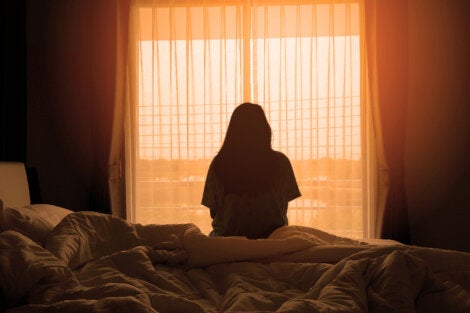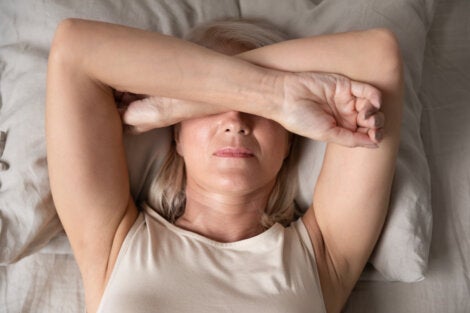Morning Sadness: Why Does it Happen?

Many people say they experience sadness first thing in the morning, more than at any other time during the day. Sometimes, the feeling can be especially severe, and may even be a sign of major depression. As the day progresses, the person will start to feel better. At night, for instance, they may not even feel any sadness.
This morning sadness has also been called “morning depression” or “diurnal mood variation”. It’s very specific. Therefore, it’s different from other kinds of depression. Its key characteristic is that it only appears during the first few hours of the day.
In some cases, morning sadness isn’t directly related to depression but rather a consequence of other causes. At the same time, in other cases, it may not just be a passing feeling of sadness in the morning but rather may form part of a more severe disorder.

Why morning sadness?
According to what science has established, morning sadness is basically due to at least one of three factors: depression, poor sleep, and the consumption of alcoholic beverages.
Regarding the first, morning sadness or morning depression is when the depression’s symptoms are stronger at the start of the day, just after the person wakes up. They may feel uninterested, unmotivated, and empty emotionally, and these feelings don’t fade away. However, as the day goes by, these symptoms can become less intense, although they may not disappear completely.
Another reason why you may feel morning sadness is due to a bad night’s sleep. You might have slept a little, but the rest wasn’t enough to help you recover from the day before. Your bedroom may not be ideal for a good night’s sleep, or it may be that you have some health problem that doesn’t let you sleep properly. Whatever the case, it’s highly likely you’ll feel terrible in the morning.
Finally, that feeling of sadness can also appear when you’ve drunk alcohol the previous evening before you went to sleep. Firstly, alcohol will have a calming effect on you, but later it will affect your sleep cycle, interrupting it during the night. On the other hand, alcohol also negatively affects the nervous system, and you’ll feel these effects the next morning.
Morning depression
Of all the different causes of morning sadness, the most complex is when it’s due to depression. This is a condition that requires professional attention because it can be a sign of a disorder or the beginning of one. The main symptoms of morning depression are the following:
- Difficulty breathing or getting out of bed. Your eyelids may feel heavy and your body seems incapable of moving.
- Problems getting to sleep at night or waking up several times during the night. This may be a sign that your body is producing more cortisol at night, which means more nighttime anxiety and trouble getting rest.
- Hypersomnia. Some people feel the need to sleep more than normal, without an apparent reason. This can be a symptom of depression, although that may not always be the case.
- Irregular eating habits. Eating too much or too little, especially at night, can be a sign that your mood isn’t as it should be.
- Lack of concentration. You might find it difficult to concentrate on your daily tasks and you try to do too many things at once, or perhaps you have trouble finishing what you started, even simple tasks.
- Irritability or feeling frustrated. These feelings are more intense in the morning but they can last all day, although they’ll likely be less intense.
- Loss of interest in the things you normally like to do and a feeling of emptiness.

What can you do?
If that feeling of morning sadness is very intense or frequent, it may be worth going to see a doctor. One in every five people who suffer from depression also has some kind of sleep disorder. You might also find out about another health condition that’s affecting your rest.
Working at night, especially if it involves a lot of stress, can also cause morning sadness. In these conditions, you could be overtaxing your body and mind, and the result is an imbalance that can manifest as sadness in the morning.
If something’s worrying you or if you constantly experience feelings of disinterest and hopelessness, you may need psychological help. The earlier you look for help, the better. Apart from these suggestions, it’s also good to cultivate good sleep habits, such as going to bed and waking up at the same time every day. These good habits can also help you get enough rest.
Many people say they experience sadness first thing in the morning, more than at any other time during the day. Sometimes, the feeling can be especially severe, and may even be a sign of major depression. As the day progresses, the person will start to feel better. At night, for instance, they may not even feel any sadness.
This morning sadness has also been called “morning depression” or “diurnal mood variation”. It’s very specific. Therefore, it’s different from other kinds of depression. Its key characteristic is that it only appears during the first few hours of the day.
In some cases, morning sadness isn’t directly related to depression but rather a consequence of other causes. At the same time, in other cases, it may not just be a passing feeling of sadness in the morning but rather may form part of a more severe disorder.

Why morning sadness?
According to what science has established, morning sadness is basically due to at least one of three factors: depression, poor sleep, and the consumption of alcoholic beverages.
Regarding the first, morning sadness or morning depression is when the depression’s symptoms are stronger at the start of the day, just after the person wakes up. They may feel uninterested, unmotivated, and empty emotionally, and these feelings don’t fade away. However, as the day goes by, these symptoms can become less intense, although they may not disappear completely.
Another reason why you may feel morning sadness is due to a bad night’s sleep. You might have slept a little, but the rest wasn’t enough to help you recover from the day before. Your bedroom may not be ideal for a good night’s sleep, or it may be that you have some health problem that doesn’t let you sleep properly. Whatever the case, it’s highly likely you’ll feel terrible in the morning.
Finally, that feeling of sadness can also appear when you’ve drunk alcohol the previous evening before you went to sleep. Firstly, alcohol will have a calming effect on you, but later it will affect your sleep cycle, interrupting it during the night. On the other hand, alcohol also negatively affects the nervous system, and you’ll feel these effects the next morning.
Morning depression
Of all the different causes of morning sadness, the most complex is when it’s due to depression. This is a condition that requires professional attention because it can be a sign of a disorder or the beginning of one. The main symptoms of morning depression are the following:
- Difficulty breathing or getting out of bed. Your eyelids may feel heavy and your body seems incapable of moving.
- Problems getting to sleep at night or waking up several times during the night. This may be a sign that your body is producing more cortisol at night, which means more nighttime anxiety and trouble getting rest.
- Hypersomnia. Some people feel the need to sleep more than normal, without an apparent reason. This can be a symptom of depression, although that may not always be the case.
- Irregular eating habits. Eating too much or too little, especially at night, can be a sign that your mood isn’t as it should be.
- Lack of concentration. You might find it difficult to concentrate on your daily tasks and you try to do too many things at once, or perhaps you have trouble finishing what you started, even simple tasks.
- Irritability or feeling frustrated. These feelings are more intense in the morning but they can last all day, although they’ll likely be less intense.
- Loss of interest in the things you normally like to do and a feeling of emptiness.

What can you do?
If that feeling of morning sadness is very intense or frequent, it may be worth going to see a doctor. One in every five people who suffer from depression also has some kind of sleep disorder. You might also find out about another health condition that’s affecting your rest.
Working at night, especially if it involves a lot of stress, can also cause morning sadness. In these conditions, you could be overtaxing your body and mind, and the result is an imbalance that can manifest as sadness in the morning.
If something’s worrying you or if you constantly experience feelings of disinterest and hopelessness, you may need psychological help. The earlier you look for help, the better. Apart from these suggestions, it’s also good to cultivate good sleep habits, such as going to bed and waking up at the same time every day. These good habits can also help you get enough rest.
All cited sources were thoroughly reviewed by our team to ensure their quality, reliability, currency, and validity. The bibliography of this article was considered reliable and of academic or scientific accuracy.
- Kerr, M. (2019, 7 de marzo). Morning depression: what it is and how to treat it. Healthline. https://www.healthline.com/health/depression/morning-depression
- Johns Hopkins Medicine. Depression and sleep: understanding the connection. https://www.hopkinsmedicine.org/health/wellness-and-prevention/depression-and-sleep-understanding-the-connection#:~:text=Depression%20and%20sleep%20problems%20are,falling%20asleep%20or%20staying%20asleep.
- Li, J. Z., Bunney, B. G., Meng, F., Hagenauer, M. H., Walsh, D. M., Vawter, M. P., … & Bunney, W. E. (2013). Circadian patterns of gene expression in the human brain and disruption in major depressive disorder. Proceedings of the National Academy of Sciences, 110(24), 9950-9955.
- McHugh, R. K., & Weiss, R. D. (2019). Alcohol use disorder and depressive disorders. Alcohol research: current reviews, 40(1).
- Salguero Noguera, J. M., & Iruarrizaga Díez, I. (2006). Relaciones entre inteligencia emocional percibida y emocionalidad negativa: ansiedad, ira y tristeza/depresión. Ansiedad estrés, 207-221.
This text is provided for informational purposes only and does not replace consultation with a professional. If in doubt, consult your specialist.







